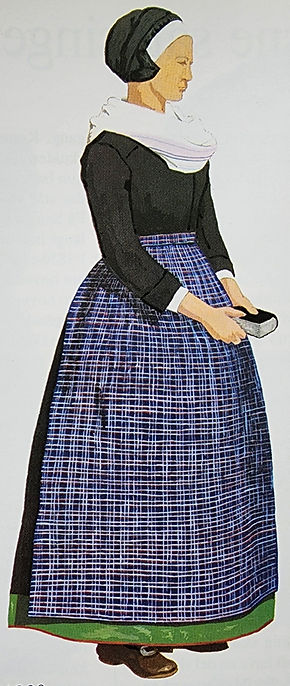Horne, Funen

Horne
Horne is both a town and a parish (sogn) in the former Svendborg County, Funen.
Its folk costume is unusual in that the man's costume is perhaps more famous than the woman's costume.
Men's Horne
Regarding headgear, the man's costume uses the variegated, striped hat ("Nikolør"s hat") used in southern Funen and on the South Funen Archipelago. The knee breeches are typically made of deerskin.
It is difficult to imagine a more daring and bold fabric pattern in Danish men's garb. If Lyø's men's vest is a neon sign, then Horne is a neon sign in Times Square. Brash and unapologetic, this costume is the proud peacock of men's attire!
The key elements of the men's costume:
a. Vest and Jacket: When you look at its hypnotic pattern, the eye senses ORANGE! However, upon closer inspection, the pattern consists of crimson red and yellow stripes close together. It is bold and distinctive!
b. Breeches: white or cream
c. Hat: Nikolør's hat

Circa 1800




In all seriousness, if this isn't the greatest Danish men's costume, I challenge you to show me a better one! This gentleman has the correct hat, he has a jacket that matches the vest. He has the stereotypical cream leather breeches. Best of all, the Horne fabric pattern is the most hypnotic and intoxicating calamanco pattern mankind ever laid eyes on. It is a feast for the senses and I wish it were not as rare as it is, because it may be Denmark's best.
Image Credit: Amager Folkedansere

Image credit: We owe an immense debt of gratitude to Morten Hansen for so generously providing this image and the ones immediately below for the benefit of those who want to enjoy and appreciate this remarkable and stunning Horne vest pattern! This fabric was reportedly purchased in the late 1970s from a Copenhagen homeweaver who offered a choice of two men's Horne vest patterns. I am told that the pattern above was the less common of the two Horne fabric patterns. The vest (and costume) was handmade by Mr. Hansen over a 3-year period with a painstaking eye for detail.

Image credit: Morten Hansen

Image credit: Morten Hansen

Image credit: Morten Hansen

Image Credit: Folkedragt.dk



Image Credit: Faaborg Folk Dancers
.jpg)
This is reportedly the more commonly seen of the two Horne men's fabric patterns. It is possible or even likely that the black section above should actually be dark green.
Image credit: Morten Hansen
.jpg)
This is reportedly the less commonly seen of the two Horne men's fabric patterns. I believe that the stripes of black should actually be hunter green.
Image credit: Morten Hansen
Women's Horne
The women's costume features a long-sleeved shirt made of fabric rather than knitted. Its hallmark feature is the dazzling calamanco pattern above the bodice. At first blush it appears to be somewhat ORANGE. But is it? Yellow and orange-red stripes may create something of an optical illusion. There's nothing like it in the Danish women's repertoire!


Image credit: Faaborg Folk Dancers

Image credit: Faaborg Folk Dancers

Image Credit: Mikael Bjerregaard





